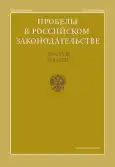On the Issue of Responsibility for the Transfer of Mobile Communications to Persons in Custody and in Places of Deprivation of Liberty
- Authors: Gelyakhova L.A.1
-
Affiliations:
- North Caucasus Institute for Advanced Studies (branch) of the Krasnodar University of the Ministry of Internal Affairs of Russia
- Issue: Vol 17, No 4 (2024)
- Pages: 30-35
- Section: Criminal - legal, criminological, administrative and other measures for countering crime in contemporary conditions
- URL: https://journal-vniispk.ru/2072-3164/article/view/265224
- EDN: https://elibrary.ru/JTIYLC
- ID: 265224
Cite item
Abstract
Mobile communications are now quite often used to commit illegal acts, and therefore access to them by persons in custody and in prison allows them to continue criminal activities. Despite the ban on transferring means of communication to the above-mentioned persons, these technical devices find themselves in their access in a variety of ways, which is associated both with the imperfect functioning of the institutions of the penal system and with the dynamics of transformation of the corresponding methods of transfer. Considering the public danger of access to mobile devices for persons in prison and custody, not only the timely suppression of acts related to their transfer, but also the imposition of a fair punishment, as well as preventive and preventive action, becomes of fundamental importance. The purpose of the presented study is to analyze the legal liability provided for by Russian legislation for the transfer of mobile communications equipment to persons in custody and in prison. The author comes to the conclusion that administrative liability under Art. 19.12 of the Code of Administrative Offenses of the Russian Federation, which was applied for the above-mentioned offenses until the end of 2023, was insufficient and ineffective, as evidenced by a fairly large number of similar offenses committed in recent years. The timeliness and validity of tightening administrative liability is noted, including in terms of identifying the transfer of mobile devices and their components directly as a separate offense, as well as introducing criminal liability for the repeated commission of this act (Article 321.1 of the Criminal Code of the Russian Federation). Attention is focused on the significant preventive potential of the institution of criminal liability within the framework of the stated issues.
Full Text
##article.viewOnOriginalSite##About the authors
Leila A. Gelyakhova
North Caucasus Institute for Advanced Studies (branch) of the Krasnodar University of the Ministry of Internal Affairs of Russia
Author for correspondence.
Email: Lel4993@mail.ru
SPIN-code: 6865-6515
Cand.Sci.(Law), police major, Head of the Department of Organization of Law Enforcement Activities
Russian Federation, NalchikReferences
- Dazmarova T.N. Administrative counteraction to the receipt of prohibited items on the territory of criminal justice institutions // Administrative law and process. 2022. No. 2. pp. 69-71.
- Draft Law No. 370297-8 «On Amendments to the Criminal Code of the Russian Federation and Articles 31 and 150 of the Code of Criminal Procedure of the Russian Federation» (On Establishing criminal Liability for the Transfer of mobile communications and communications equipment to Persons Held in institutions of the penal enforcement system or temporary detention facilities). URL: https://sozd.duma.gov.ru/bill/370297-8 (date of application: 04/10/2024).
- Nuzhdin A.A. Organizational and criminalistic aspects of preventing «mobile» frauds committed in places of detention // Bulletin of the Kuzbass Institute. 2022. No. 2(51). pp. 147-157.
- Report on the work of the courts of general jurisdiction on the consideration of cases of administrative offenses for 2022. URL: http://www.cdep.ru/userimages/Sudebnaya_statistika_2022/F2-svod-vse-sudy-2022.xls (date of application: 04/10/2024).
- Report on the work of the courts of general jurisdiction on the consideration of cases of administrative offenses for 2021. URL: http://www.cdep.ru/userimages/Sudebnaya_statistika_2022/F2-svod-vse_sudy-2021.xls (date of application: 04/10/2024).
- Report on the work of the courts of general jurisdiction on the consideration of cases of administrative offenses for the 1st half of 2023. URL: http://www.cdep.ru/userimages/_F2-svod_vse-sudy-1-2023.xls (date of application: 04/10/2024).
- Senognoev A.V., Gukova N.A. Prevention of the transfer of mobile communication facilities to persons held in temporary detention facilities of suspects and accused law enforcement agencies // Administrative and legal regulation of law enforcement: theory and practice: Materials of the International Scientific and Practical Conference, Krasnodar, June 09, 2023 / Editorial board: K.D. Rydchenko, A.G. Bely, A.D. Abramkin [and Krasnodar: Federal State Budgetary Educational Institution of Higher Education «Krasnodar University of the Ministry of Internal Affairs of the Russian Federation», 2023. pp. 250-254.
- Cherednichenko E.E. Remote fraud: problems of prevention, investigation and law enforcement // Problems of economics and legal practice. 2023. Vol. 19, No. 1. pp. 211-214.
- The number of cell phones seized in colonies continues to fall. URL: https://www.vedomosti.ru/technology/articles/2024/01/30/1017380-chislo-izyatih-v-koloniyah-sotovih-telefonov-prodolzhaet-padat (date of application: 04/10/2024).
Supplementary files








